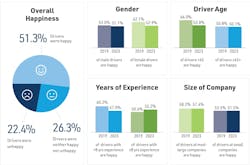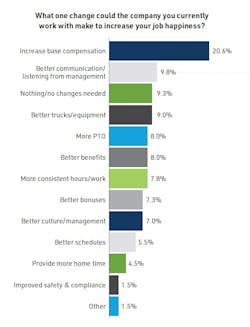Truck drivers aren’t as happy as they were before the pandemic. A survey conducted in late 2022 and early 2023—before the sharp decline in freight rates—found that only 51% of 500 CDL drivers felt happy on the job. In 2019, 54% said they were happy.
What’s keeping these drivers from being happy on the job? Better pay and better communication were the top two ways employers could improve the job, according to the Drive My Way survey.
See also: How to make drivers feel appreciated
The problem with pay
When asked what employers could do to increase job happiness, the top answer was a pay increase, which might not be surprising. However, it's important to note that average hourly wage and base pay for truckers have increased by 17.9% since September 2019.
Years ago, drivers would complain about their pay "a lot," Leah Shaver, president and CEO of the National Transportation Institute, told FleetOwner. She also hosts the Road Dog Trucking Radio show on SiriusXM and communicates with truckers frequently. She's heard fewer complaints about pay within the last couple of years, and even this year, she told FleetOwner. It's only been recently that she's heard more pay-related complaints, most of which were related to lower miles and rates for owner-operators.
"I do think that many companies have been able to master the pay concerns of drivers," Shaver said. "It's particularly difficult, though, in this specific sector of for-hire truckload carriers because the market is indeed volatile, cyclical, it is productivity-driven.
"In a for-hire fleet specifically, miles are ... controllable, but they're generally going to be outside of a driver's day-to-day control. Yes, (drivers) could be highly productive and still not have a load when they get to their destination. So, considering the volatility of the market today, absolutely, drivers are going to continue to be unhappy."
But that doesn't mean fleet owners can't make improvements. It's all up to the company and where it places its priorities. Companies that place a priority on employee well-being and happiness will prioritize dependable earnings for drivers while also safeguarding their relationship with their customers, according to Shaver.
Pay, however, isn't the only means of compensation for drivers. Increasingly, more are looking for other benefits, as well, Portratz said. These include more home time, a routine, better equipment, and development opportunities.The communication gap
Increasing pay, loads, and miles are all dependent on the market. But of the drivers surveyed, their second-highest request for keeping them happy lies in something any fleet can improve without spending a dime. That’s communication.
In the trucking industry, leadership has lagged in being upfront and open with communication with their people—specifically their drivers, according to Portratz.
“I think there's a long way to go in how do we engage employees at all levels on what's happening within the industry,” Portratz told FleetOwner, offering examples such as how industry news and updates relate to the company and the role of a driver. “There's a whole lot of work to be done in that area.”
One group that could benefit most from streamlined and intentional communication techniques and strategies is the younger, less experienced drivers.
Less experienced drivers are leading the decline in overall driver happiness. In 2019, 60.2% of drivers with eight years or fewer behind the wheel said they were happy. Fast-forward to 2023, only 47% of drivers with less experience said they were happy.
Potratz told FleetOwner that there’s a correlation between less-experienced drivers and younger drivers. These younger, millennial drivers have different expectations of their jobs than their older coworkers.
“They want to have that balance of work and life,” Portratz told FleetOwner. “They want to be heard. They want to be part of the conversation. They want to know specifically how they can make an impact.”
As carriers work hard to attract young talent, Portratz said, “they need to pay just as much attention to fostering and nurturing that relationship throughout the entire employment life cycle.”
Part of nurturing and fostering a relationship is to keep younger, less-experienced drivers aware of what’s happening in the market.
“If a driver has been with their company for fewer than two years, they likely have not had to deal with a lot of unpaid, unproductive time, Shaver told FleetOwner. “There are many drivers that didn't even experience layover or layover pay during the pandemic, and now ... we have more assets on the ground than we have freight. So certainly, I think there could be a disconnect related to communication in terms of what's happening in the market and what that really means to me as the driver.”
Fleet owners and managers should also recognize how communication needs and desires from drivers of one generation will differ from the needs of drivers in another generation.
“We currently have four generations of folks that are working in trucks today,” Shaver said. “Millennials have different expectations with regards to communication than, for example, boomers.”
Where an older driver has established their role in the industry and established their preferred ways of communication within the industry, millennials communicate differently.
“They want recognition through advancement,” Shaver said. “You know, they're using a variety of different ways to communicate different methods. If they're not seeing and getting that enrichment in the job by way of that communication, then they're likely going to have increased dissatisfaction, too."
See also: Keeping drivers informed is another way to keep them happy
Knock down communication barriers
Fleet owners who wish to maintain driver happiness must learn to communicate with all their drivers, not just the seasoned ones. Shavers said one way to do this is by using multiple communication channels and "internal marketing" to communicate with drivers regularly.
"Success stories that we see here involve using social media like Facebook Live or even private Facebook groups to allow for direct communication with leadership on a regular basis," Shaver said.
These communication channels help everyone in the organization understand what's happening with customers, the freight market, and what to expect in the future, Shaver explained.
Further, the C-suite should be the first to model what needs to be done to begin having those conversations, Portratz added. It's up to the C-suite to lay out the key messages and allow for that two-way dialogue.
"I feel like we drop the ball when the C-Suite doesn't provide materials and talking points on key messages for all of the layers of leadership below so that the entire leadership team is carrying out those messages," Portratz told FleetOwner. "It's really quite critical that (drivers are) hearing a unified message, they're hearing it often, and that they're hearing it across different modes of communication based on their generational differences."
Effective communication strategies can not only improve internal operations and increase driver happiness, they can also reflect well on the company.
"Using internal communication methods that are also public—like social media," Shaver said, "allows for not only the current workers to understand what's happening with the organization, but also, it shows external folks that might be considering the organization to really see how you approach your people, your customers, your business."
See also: How to mitigate drivers' top concerns
When an employer opens communication and begins listening to their drivers, they must be willing to act, Portratz warned.
"You can't open the door to conversation and not be willing to accept the feedback and start taking action," Portratz said. "And once you start doing it, you need to continue to do it. It's not just taking stock in folks when times are hard. It should be an ongoing practice in the organization."
When fleet owners take action, their drivers feel heard, and when they're listened to, they thrive. Thriving drivers help their company succeed, Shaver said.
"Continue to focus on what it is that employees need to thrive in their job," Shaver said, "and also helps that happy employee want to continue to do more and do better for the organization."
About the Author
Jade Brasher
Senior Editor Jade Brasher has covered vocational trucking and fleets since 2018. A graduate of The University of Alabama with a degree in journalism, Jade enjoys telling stories about the people behind the wheel and the intricate processes of the ever-evolving trucking industry.



